
The Bible is a collection of religious texts or scriptures, some, all, or a variant of which are held to be sacred in Christianity, Judaism, Samaritanism, Islam, the Baha'i Faith, and other Abrahamic religions. The Bible is an anthology originally written in Hebrew, Aramaic, and Koine Greek. The texts include instructions, stories, poetry, prophecies, and other genres. The collection of materials that are accepted as part of the Bible by a particular religious tradition or community is called a biblical canon. Believers in the Bible generally consider it to be a product of divine inspiration, but the way they understand what that means and interpret the text varies.
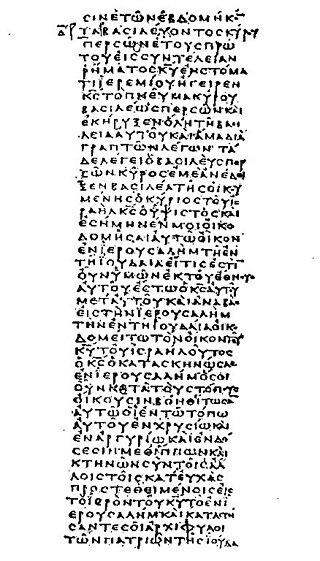
The Septuagint, sometimes referred to as the Greek Old Testament or The Translation of the Seventy, and often abbreviated as LXX, is the earliest extant Greek translation of the Hebrew Bible from the original Hebrew. The full Greek title derives from the story recorded in the Letter of Aristeas to Philocrates that "the laws of the Jews" were translated into the Greek language at the request of Ptolemy II Philadelphus by seventy-two Hebrew translators—six from each of the Twelve Tribes of Israel.

The Vulgate is a late-4th-century Latin translation of the Bible.

The Masoretic Text is the authoritative Hebrew and Aramaic text of the 24 books of the Hebrew Bible (Tanakh) in Rabbinic Judaism. The Masoretic Text defines the Jewish canon and its precise letter-text, with its vocalization and accentuation known as the mas'sora. Referring to the Masoretic Text, masorah specifically means the diacritic markings of the text of the Jewish scriptures and the concise marginal notes in manuscripts of the Tanakh which note textual details, usually about the precise spelling of words. It was primarily copied, edited, and distributed by a group of Jews known as the Masoretes between the 7th and 10th centuries of the Common Era (CE). The oldest known complete copy, the Leningrad Codex, dates from the early 11th century CE.

The Samaritan Pentateuch, also called the Samaritan Torah, is the sacred scripture of the Samaritans. Written in the Samaritan script, it dates back to one of the ancient versions of the Torah that existed during the Second Temple period. It constitutes the entire biblical canon in Samaritanism.

Textual criticism is a branch of textual scholarship, philology, and literary criticism that is concerned with the identification of textual variants, or different versions, of either manuscripts (mss) or of printed books. Such texts may range in dates from the earliest writing in cuneiform, impressed on clay, for example, to multiple unpublished versions of a 21st-century author's work. Historically, scribes who were paid to copy documents may have been literate, but many were simply copyists, mimicking the shapes of letters without necessarily understanding what they meant. This means that unintentional alterations were common when copying manuscripts by hand. Intentional alterations may have been made as well, for example, the censoring of printed work for political, religious or cultural reasons.
Biblical studies is the academic application of a set of diverse disciplines to the study of the Bible. For its theory and methods, the field draws on disciplines ranging from ancient history, historical criticism, philology, theology, textual criticism, literary criticism, historical backgrounds, mythology, and comparative religion.

The New Living Translation (NLT) is a translation of the Bible in contemporary English. Published in 1996 by Tyndale House Foundation, the NLT was created "by 90 leading Bible scholars." The NLT relies on recently published critical editions of the original Hebrew, Aramaic, and Greek texts.
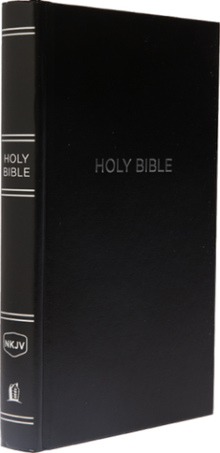
The New King James Version (NKJV) is a translation of the Bible in contemporary English. Published by Thomas Nelson, the complete NKJV was released in 1982. With regard to its textual basis, the NKJV relies on a modern critical edition for the Old Testament, while opting to use the Textus Receptus for the New Testament.

The Biblia Hebraica Stuttgartensia, abbreviated as BHS or rarely BH4, is an edition of the Masoretic Text of the Hebrew Bible as preserved in the Leningrad Codex, and supplemented by masoretic and text-critical notes. It is the fourth edition in the Biblia Hebraica series started by Rudolf Kittel and is published by the Deutsche Bibelgesellschaft (German Bible Society) in Stuttgart.
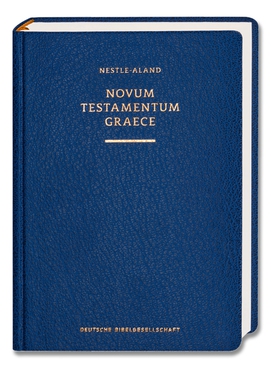
Novum Testamentum Graece is a critical edition of the New Testament in its original Koine Greek, forming the basis of most modern Bible translations and biblical criticism. It is also known as the Nestle–Aland edition after its most influential editors, Eberhard Nestle and Kurt Aland. The text, edited by the Institute for New Testament Textual Research, is currently in its 28th edition, abbreviated NA28.

The Biblia Hebraica Quinta Editione, abbreviated as BHQ or rarely BH5, is the fifth edition of the Biblia Hebraica. When completed, it will supersede the fourth edition, the Biblia Hebraica Stuttgartensia (BHS/ BH4).

Emanuel Tov is a Dutch–Israeli biblical scholar and linguist, emeritus J. L. Magnes Professor of Bible Studies in the Department of Bible at the Hebrew University of Jerusalem. He has been intimately involved with the Dead Sea Scrolls for many decades, and from 1991, he was appointed Editor-in-Chief of the Dead Sea Scrolls Publication Project.
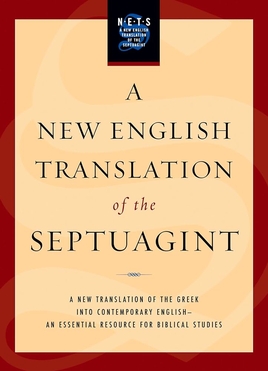
The New English Translation of the Septuagint and the Other Greek Translations Traditionally Included under That Title (NETS) is a modern translation of the Septuagint (LXX), that is the scriptures used by Greek-speaking Christians and Jews of antiquity. The translation was sponsored by the International Organization for Septuagint and Cognate Studies (IOSCS). The Psalms were published in 2000 and the complete Septuagint in 2007.
The Hebrew University Bible Project (HUBP) is a project at the Hebrew University of Jerusalem to create the first edition of the Hebrew Bible that reproduces the text of the Aleppo Codex and includes a thorough critical apparatus.
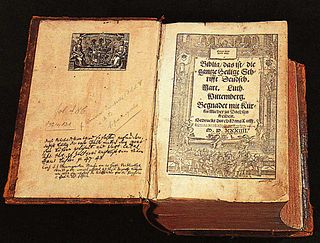
A Protestant Bible is a Christian Bible whose translation or revision was produced by Protestant Christians. Typically translated into a vernacular language, such Bibles comprise 39 books of the Old Testament and 27 books of the New Testament, for a total of 66 books. Some Protestants use Bibles which also include 14 additional books in a section known as the Apocrypha bringing the total to 80 books. This is in contrast with the 73 books of the Catholic Bible, which includes seven deuterocanonical books as a part of the Old Testament. The division between protocanonical and deuterocanonical books is not accepted by all Protestants who simply view books as being canonical or not and therefore classify books found in the Deuterocanon, along with other books, as part of the Apocrypha. Sometimes the term "Protestant Bible" is simply used as a shorthand for a bible which contains only the 66 books of the Old and New Testaments.

The Papyrus Fouad 266 are fragments, part of a papyrus manuscript in scroll form containing the Greek translation, known as the Septuagint, of the Pentateuch. They have been assigned palaeographically to the 1st century BCE. There is discussion about whether the text is original or a later recension of the Septuagint.
The Literal English Version of Scripture (LEV) is a translation of the Bible based on the World English Bible. Formerly known as the "Shem Qadosh Version", the title was officially changed in November 2016. It is considered a Sacred Name Bible rendering the name of God using the Hebrew characters יהוה, and that of Jesus in Hebrew as ישוע. It was created by a team of volunteers across the United States with additional proofing and editing assistance by individuals in Poland and Taiwan. Footnotes and appendices were written by the General Editor, J. A. Brown.
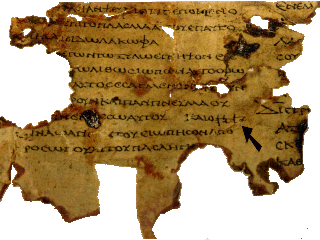
The kaige revision, or simply kaige, is the group of revisions to the Septuagint made in order to more closely align its translation with the proto-Masoretic Hebrew. The name kaige derives from the revision's pervasive use of Koinē Greek: και γε to translate the Hebrew: וְגַם. The importance of this revision lies in its status as a precursor to later revisions by 'the Three' as well as the light it sheds on the origins of the Septuagint.
Ronald Lewis Troxel is a retired professor emeritus and Chair of the Department of Hebrew and Semitic Studies at the University of Wisconsin-Madison.















